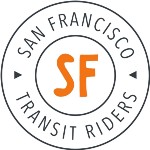San Francisco Transit Riders (SFTR) is a proud member of the coalition of advocates that rallied to prevent billions of dollars in cuts to transit funding in the state budget earlier this year. Leading with the riders’ voices, SFTR members joined transit advocates throughout the state in making phone calls, sending emails, and hosting rallies that ultimately convinced lawmakers to reverse the proposed funding cuts and allocate $1.1 billion in new funding for California’s transit agencies. We are proud of the countless SFTR members and other advocates who spent time working to get this funding passed and to keep our city moving, for now.
But the fight isn’t over.
When all is said and done, only about $400 million of the new money from the state will go towards funding Bay Area transit operations over the next five years. While that is enough to postpone major cuts to transit service in the short term, more money is still needed to sustain transit in the long term, and to serve changing travel patterns post-pandemic. SPUR estimates that altogether, Bay Area transit agencies face a $2.5 billion deficit over the next five years. At a June board meeting, SFMTA Executive Director Jeff Tumlin predicted that the state budget will only cover one-third of what is needed to prevent “significant service cuts” to Muni in the coming years.
Ultimately, California needs a long-term, sustainable funding plan that will enable transit agencies to not only survive, but also expand to meet riders’ needs and address problems like lack of safety, inequity, and climate change. SFTR is working with our members and partners to identify what that long-term plan looks like, including new sources of local funding like parking fees or a regional ballot measure in 2026. In the meantime, Bay Area transit needs a temporary lifeline to ensure that agencies aren’t forced to cut service before a more sustainable funding source can go into effect. That’s where SB-532 comes in.
SB-532, introduced by Senator Scott Wiener, would temporarily raise bridge tolls on most Bay Area bridges by $1.50 for five years, with all the new revenue going towards sustaining public transit. At least 90% of revenue would go towards maintaining the current level of service, with up to 10% being used for improvements to service, customer satisfaction, and coordination between agencies. All told, the toll increase is expected to bring in about $180 million annually. Together with the $400 million in new money from the state budget and $300 million in flexible funds from MTC, this will likely be enough to meet transit agencies’ three-year need and sustain transit at its current service levels until a regional funding measure can go to the voters in 2026.
SFTR is aware that a toll increase will place a burden on low-income drivers, which is why we are working with the bill’s sponsors to strengthen SB-532’s equity provisions. For example, we support adding monthly caps to the amount of times drivers would be charged the additional toll — a measure which would help lower-income workers who frequently need to drive long distances to get to work. Alternatively, in the absence of stronger equity provisions for drivers, SFTR would like to see more equity provisions in place for transit riders, like allowing the money raised by the bill to be used to prevent fare increases.
The negative consequences of letting transit agencies fail would hurt low-income San Franciscans more than a temporary toll increase. Nearly half of all Bay Area transit riders have a household income below $35,000, and about 250,000 Bay Area households do not own a vehicle. Cuts to transit service would force many of these households to invest in car ownership, a major financial burden for anyone, especially those already struggling financially. A recent analysis by SPUR found that transit riders are more racially and economically diverse than people who drive across the bridges, and that while most bridge drivers are not economically disadvantaged, most BART riders are, especially now that the share of higher-income BART riders has decreased in the wake of the pandemic. For low-income people who must drive, SB-532 contains provisions that will reduce the burden of fines and tolls for frequent bridge users.
Allowing transit agencies to go unfunded would hurt economically disadvantaged and transit-dependent people the worst, leaving thousands of transit riders — including workers, seniors, and people with disabilities — without a reliable way of getting around.
A robust public transportation system helps everybody, and the Bay Area can and should lead the way in shifting California away from its current system of car dependency. SB-532 takes a small and crucial step in the right direction by taking a rider-focused approach to generating the revenue needed to keep transit lines running. SFTR joins SF Assemblymembers Ting and Haney and Senator Wiener, as well as other Bay Area leaders, cities, transit agencies, and grassroots organizations supporting SB-532. Transit riders deserve fast, safe, vast, and affordable service, and SB-532 will help ensure that transit agencies aren’t forced to lose progress on achieving those crucial goals. We will continue working with the bill’s sponsors to ensure the bill does all it can to address the needs of transit riders and low-income drivers alike.
For more information on SB-532, see the links below:


